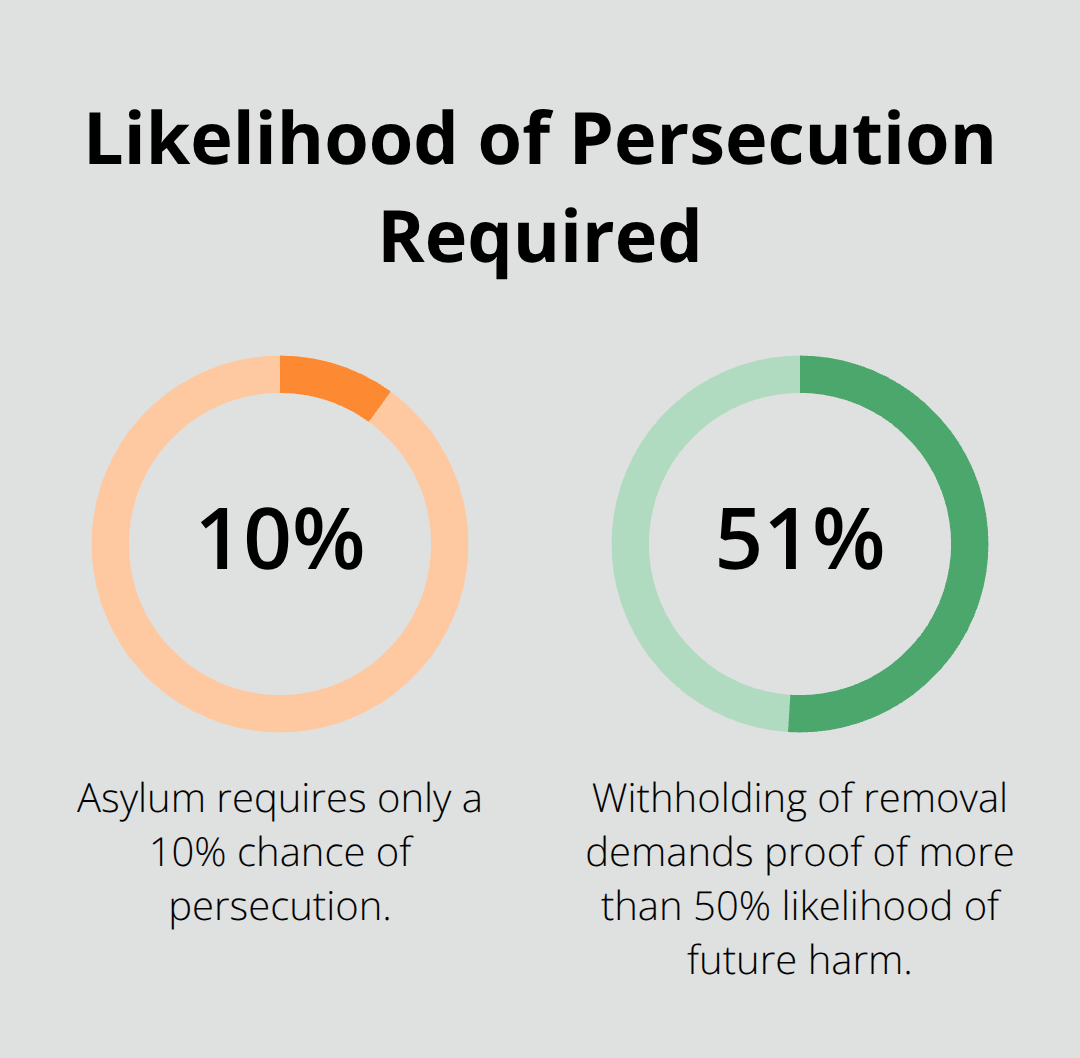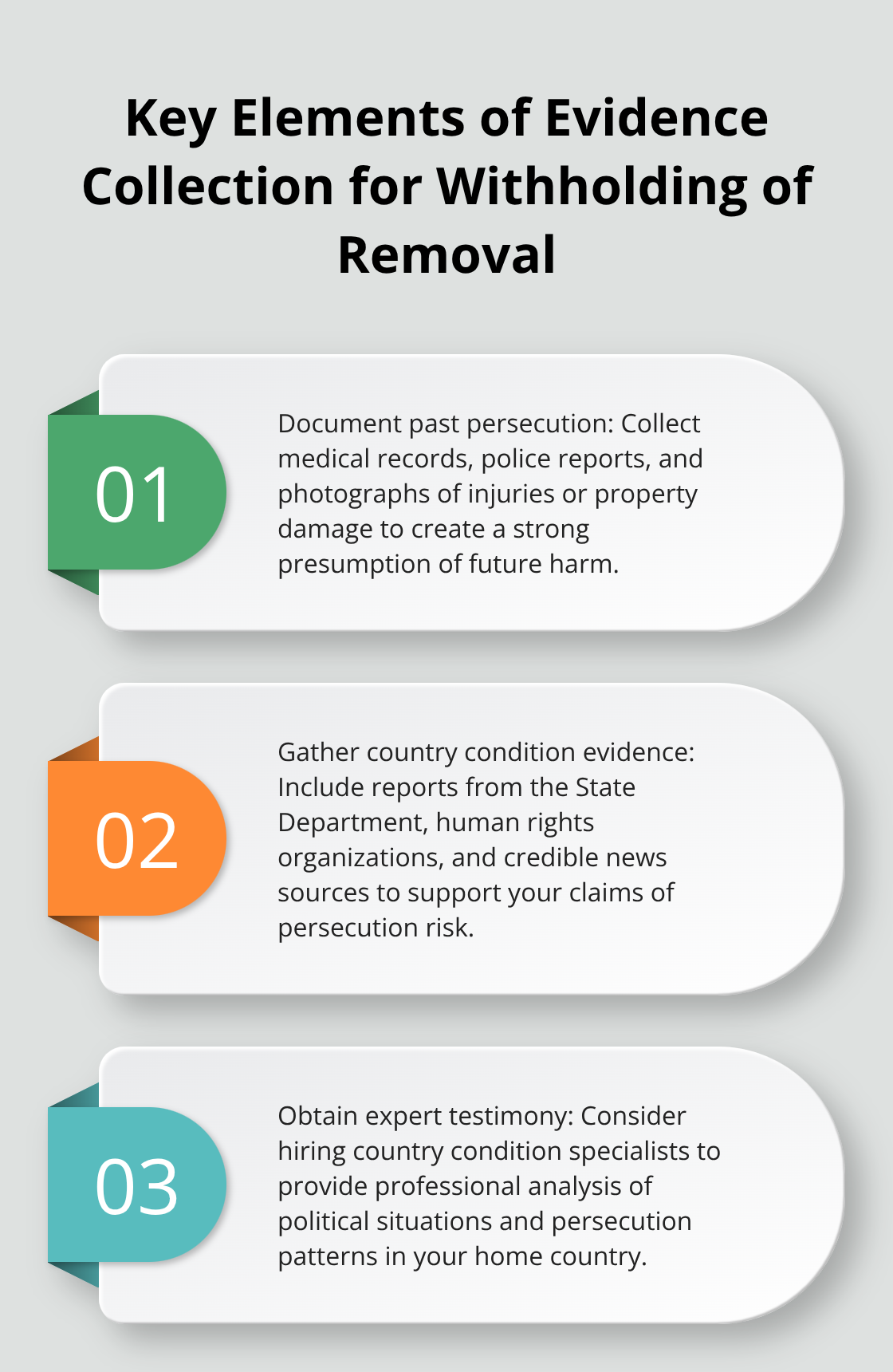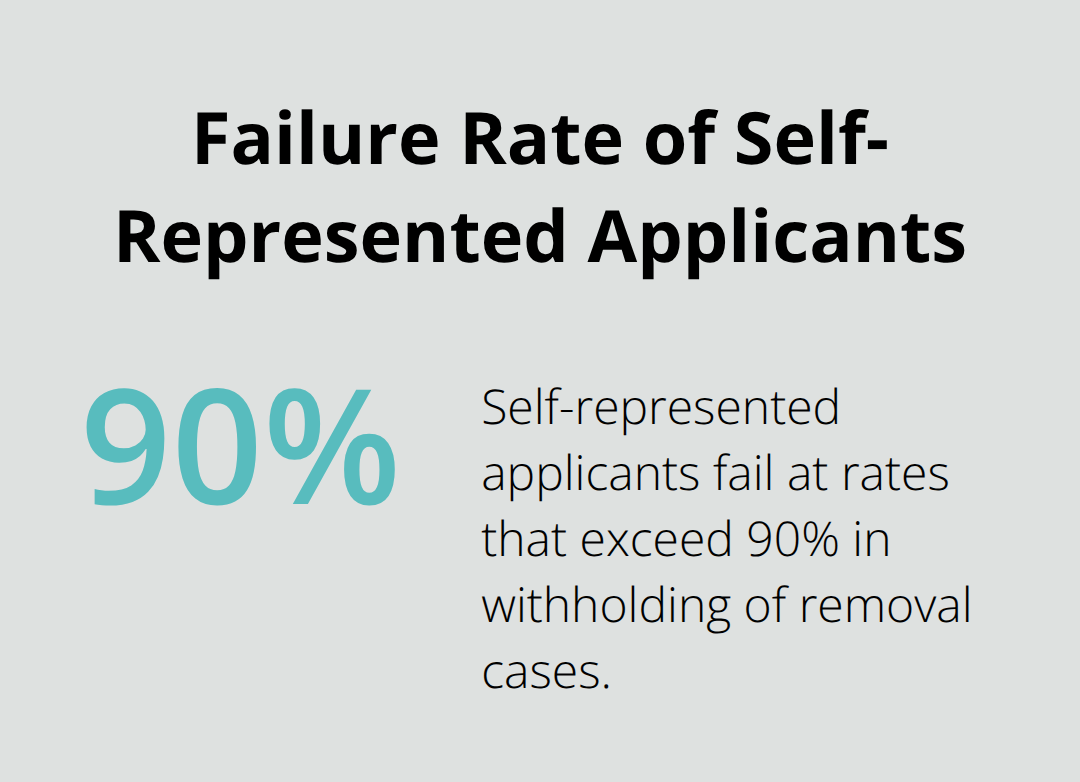
How to Apply for Withholding of Removal
Withholding of removal offers protection for individuals who face persecution in their home countries but may not qualify for asylum. This immigration relief can be particularly complex when combined with other processes like adjustment of status through marriage.
We at Law Offices of Jeffrey A. Thompson understand the intricate requirements and strict deadlines involved in these cases. The application process demands precise documentation and thorough preparation to succeed.
What Protection Does Withholding of Removal Offer
Legal Foundation and Requirements
Withholding of removal operates under Section 241(b)(3) of the Immigration and Nationality Act and provides mandatory protection when an individual faces a clear probability of persecution. Unlike asylum applications that require only a 10% chance of persecution, withholding demands proof of more than 50% likelihood of future harm. This higher standard makes withholding significantly harder to obtain, but it serves as a lifeline for those barred from asylum eligibility.

The Immigration and Nationality Act section 208(a)(2)(B) establishes the one-year deadline for asylum applications, but withholding of removal has no time limit. This makes withholding the primary option for individuals who missed the asylum deadline or face other asylum bars. Most individuals who demonstrate a credible fear enter formal removal proceedings in immigration courts, where they may pursue protection claims.
Key Differences from Asylum Status
Asylum grants permanent protection and opens pathways to green cards and citizenship, while withholding provides only temporary relief that can be revoked if country conditions improve. Asylees can petition for their spouse and unmarried children under 21 within two years of approval, but withholding recipients cannot bring family members to the United States. This family separation often devastates recipients who remain indefinitely separated from loved ones.
Travel restrictions create another stark difference. Asylees can obtain refugee travel documents for international trips, but withholding recipients face complete travel bans. They lose their protection permanently if they leave the United States. Both statuses qualify for employment authorization and federal benefits like Medicaid and SNAP, but only asylum leads to permanent residency after one year.
Standards and Factors That Qualify Applicants
Persecution must be based on race, religion, nationality, political opinion, or membership in a particular social group. Past persecution creates a presumption of future harm, but applicants can still qualify by demonstrating future persecution risks. Government inability or unwillingness to protect the applicant strengthens the case significantly.
Criminal bars eliminate many withholding applications. Aggravated felonies, serious nonpolitical crimes, and terrorism-related activities disqualify applicants permanently. These bars affect withholding more severely than asylum (as no exceptions exist). Individuals previously deported can still apply for withholding, unlike asylum which requires physical presence in the United States at the time of application.
The complex nature of these requirements makes proper documentation and legal strategy essential for success in withholding cases.
How Do You File for Withholding of Removal
Form I-589 Requirements and Core Documentation
Form I-589 acts as your primary application for withholding of removal protection. This identical form handles both asylum and withholding applications. You must submit this form whether you previously sought asylum or currently face removal proceedings. The application demands complete personal details, thorough persecution accounts, and substantial evidence that validates your claims.
Immigration judges process numerous cases annually, with withholding-only proceedings representing a small fraction of total immigration court cases. Most applicants file defensively through immigration courts rather than affirmatively with USCIS, especially when removal proceedings have already begun.
Your documentation package must extend well beyond the basic form. Country condition evidence from State Department reports, human rights organizations, and credible news sources strengthens your position substantially. Medical records that document past persecution injuries, official police reports, witness statements, and expert testimony form the backbone of successful applications.
Translation and Document Preparation Standards
All foreign documents require certified English translations. Professional translation services typically charge between $150 to $300 per document, depending on complexity and length. Courts reject applications with inadequate translations, making this investment necessary for case success.
Document organization matters significantly. Immigration judges review hundreds of cases monthly and appreciate clear, logical presentation of evidence. Chronological arrangement of persecution events, indexed exhibits, and summary charts help judges process your case efficiently.
Evidence Collection Strategies That Win Cases
Evidence quality determines outcomes more than any other single factor. Past persecution documentation carries exceptional weight because it creates legal presumptions of future harm that shift the burden to the government. Photographs of injuries, scars, or damaged property provide compelling visual evidence that resonates with immigration judges.
Expert witness testimony from country condition specialists costs between $5,000 to $15,000 but dramatically improves success rates in complex cases. These experts analyze political situations, social conditions, and persecution patterns in your home country. Their professional opinions often make the difference between approval and denial.

Corroboration and Supporting Evidence
Multiple evidence sources validate your persecution claims effectively. Family member affidavits, medical expert opinions, and psychological evaluations create comprehensive documentation of harm suffered and anticipated. The American Immigration Lawyers Association’s 2016 study revealed that represented applicants succeed at rates 10 times higher than those who represent themselves.
Witness statements from individuals who observed your persecution or understand country conditions add credibility to your case. These statements must be detailed, specific, and notarized to carry weight in court proceedings.
However, even the strongest evidence collection strategy faces significant obstacles when language barriers and complex legal requirements create additional challenges that can derail your application.
What Obstacles Will You Face
Language and Translation Complications
Professional translation costs drain budgets quickly, with certified translations ranging from $150 to $300 per document. Immigration courts reject applications with inadequate translations, making this expense unavoidable. The American Immigration Lawyers Association found that poor translations cause 23% of withholding application delays. Courts require certified translations for birth certificates, police reports, medical records, and witness statements from your home country.
Translation quality varies dramatically between services. Budget translation companies often miss legal terminology nuances that immigration judges scrutinize closely. Professional legal translation services cost more but understand immigration court standards. Request sample translations before you commit to large document packages. Many applicants waste thousands on retranslations when initial work fails court requirements.
Documentation Collection Challenges
Evidence collection from persecution-prone countries presents significant obstacles. Government corruption, destroyed records, and dangerous conditions make document retrieval nearly impossible. Many countries that experience persecution lack reliable record-keeping systems. Contact family members, friends, or human rights organizations in your home country to locate essential documents before they disappear permanently.
Medical records that document past persecution injuries carry exceptional weight in court proceedings. Hospital records, X-rays, and physician statements create compelling evidence packages. Psychological evaluations from licensed professionals cost between $2,000 to $4,000 but establish persecution trauma effectively. These evaluations must meet specific court standards and include detailed persecution impact assessments.
Complex Legal Navigation Requirements
Immigration law changes constantly, with new precedent decisions that affect withholding applications monthly. The Board of Immigration Appeals issued 47 precedent decisions in 2023 that modified withholding standards. Self-represented applicants fail at rates that exceed 90% according to immigration court statistics.
Legal representation improves success rates dramatically, with represented applicants who win withholding cases at 10 times higher rates than those who proceed alone. Immigration attorneys understand current law, court preferences, and judge-specific requirements that determine case outcomes (particularly in complex persecution scenarios).
Evidence Standards and Court Expectations
Immigration judges process hundreds of cases monthly and expect precise documentation standards. Courts demand specific formatting, proper authentication, and complete chain of custody for all evidence submitted. Missing signatures, incorrect notarization, or improper exhibit labeling can result in evidence exclusion that destroys otherwise strong cases.
Country condition evidence must come from credible sources like State Department reports, United Nations documents, or recognized human rights organizations. Judges reject Wikipedia articles, personal blogs, or unverified news sources. Expert witness testimony costs between $5,000 to $15,000 but provides professional analysis that courts respect and rely upon for complex country condition determinations.

Final Thoughts
Withholding of removal applications require meticulous preparation and comprehensive evidence collection. Form I-589 serves as your foundation, but success demands extensive documentation that includes country condition reports, medical records, witness statements, and professional translations. The higher burden of proof means you must demonstrate more than 50% likelihood of persecution, which makes thorough case preparation absolutely essential.
Professional legal representation transforms your chances of success dramatically. Immigration attorneys understand current precedent decisions, court preferences, and evidence standards that determine outcomes. Self-represented applicants fail at rates that exceed 90%, while represented applicants succeed 10 times more frequently.
Court proceedings may span several years after you file your application. Immigration courts process cases slowly, and withholding applications face additional scrutiny due to their permanent nature. Complex cases like withholding of removal adjustment of status marriage require specialized knowledge that only experienced immigration attorneys possess.


